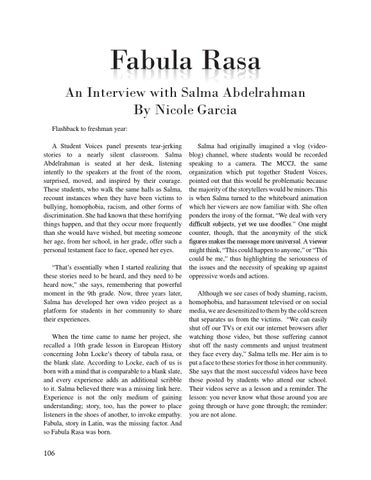Fabula Rasa An Interview with Salma Abdelrahman By Nicole Garcia Flashback to freshman year: A Student Voices panel presents tear-jerking stories to a nearly silent classroom. Salma Abdelrahman is seated at her desk, listening intently to the speakers at the front of the room, surprised, moved, and inspired by their courage. These students, who walk the same halls as Salma, recount instances when they have been victims to bullying, homophobia, racism, and other forms of discrimination. She had known that these horrifying things happen, and that they occur more frequently than she would have wished, but meeting someone her age, from her school, in her grade, offer such a personal testament face to face, opened her eyes. “That’s essentially when I started realizing that these stories need to be heard, and they need to be heard now,” she says, remembering that powerful moment in the 9th grade. Now, three years later, Salma has developed her own video project as a platform for students in her community to share their experiences. When the time came to name her project, she recalled a 10th grade lesson in European History concerning John Locke’s theory of tabula rasa, or the blank slate. According to Locke, each of us is born with a mind that is comparable to a blank slate, and every experience adds an additional scribble to it. Salma believed there was a missing link here. Experience is not the only medium of gaining understanding; story, too, has the power to place listeners in the shoes of another, to invoke empathy. Fabula, story in Latin, was the missing factor. And so Fabula Rasa was born.
106
Salma had originally imagined a vlog (videoblog) channel, where students would be recorded speaking to a camera. The MCCJ, the same organization which put together Student Voices, pointed out that this would be problematic because the majority of the storytellers would be minors. This is when Salma turned to the whiteboard animation which her viewers are now familiar with. She often ponders the irony of the format, “We deal with very difficult subjects, yet we use doodles.” One might counter, though, that the anonymity of the stick figures makes the message more universal. A viewer might think, “This could happen to anyone,” or “This could be me,” thus highlighting the seriousness of the issues and the necessity of speaking up against oppressive words and actions. Although we see cases of body shaming, racism, homophobia, and harassment televised or on social media, we are desensitized to them by the cold screen that separates us from the victims. “We can easily shut off our TVs or exit our internet browsers after watching those video, but those suffering cannot shut off the nasty comments and unjust treatment they face every day,” Salma tells me. Her aim is to put a face to these stories for those in her community. She says that the most successful videos have been those posted by students who attend our school. Their videos serve as a lesson and a reminder. The lesson: you never know what those around you are going through or have gone through; the reminder: you are not alone.
